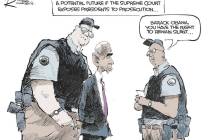ADA regulations
Proponents of the Americans with Disabilities Act assured skeptics in the late 1980s that the proposed legislation wouldn't impose undue costs or hardships. It would simply require a few "reasonable accommodations."
Widen a doorway here, provide a wheelchair ramp there -- there weren't even likely to be many lawsuits.
The ADA was enacted into law in 1990, and now approaches its 20th birthday. Let's just say compliance costs have turned out to be a bit higher than estimated. The "not many lawsuits" promise was DOA and even after 18 years hardly anyone is able to agree on just what this law requires -- even as the supporting political constituency known as "the disabled" continues to grow by leaps and bounds.
The Justice Department has just proposed adding 1,000 pages of new regulations to help "clarify" what the ADA requires, in America's ongoing efforts to provide equal access for the disabled.
But who are "the disabled"? The Census Bureau now claims there are more than 51 million disabled Americans, representing 18 percent of the population. Does one in six of your fellow Americans look "disabled" to you?
Few can object to the original stated purpose of the law.
If a few inexpensive adaptations at the library or the bookstore can make it easier for a blind woman or a man in a wheelchair to get around and participate in the nation's commerce, most Americans are happy to cooperate.
But when there are government benefits available to anyone who can get their problem classified as a "legal disability," it's no surprise lobbying pressure has been applied to get everything from alcoholism to depression to the inability to have sex qualified for a "disability" check -- and some special provision in the regulations.
Imagine: a thousand pages of new regulations, obedience to which could cost 7 million affected businesses plus state and local government agencies $23 billion over the next 40 years, according to the Justice Department -- which hasn't factored in the cost of defending against litigation from those who argue the new rules "still don't go far enough," of whom there are plenty.
Among the millions of businesses and other public facilities that would be affected by the proposed regulatory changes? Courthouses, drinking fountains, amusement park rides, stadium and theater seating, fishing piers, boat slips, bowling lanes -- even miniature golf courses, where 50 percent of the holes would now have to be accessible for players in wheelchairs.
We are not, as Dave Barry used to say, making this up.























